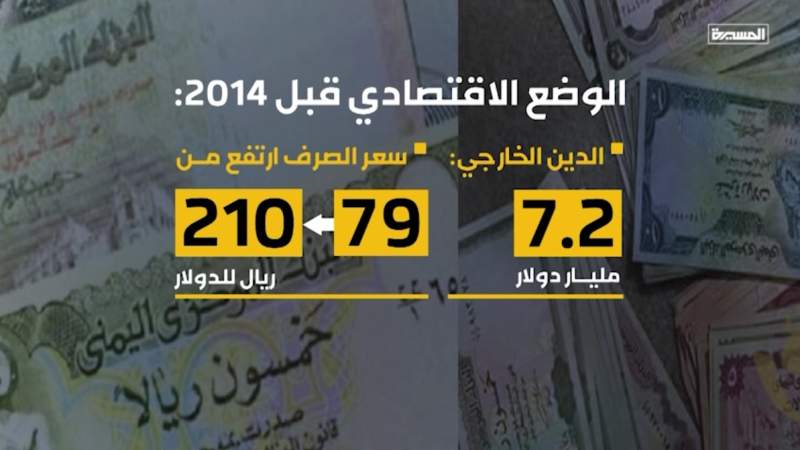Yemen’s Wealth Plundered: Report Exposes Grim Economic Reality Before September 21 Revolution

News - Yemen: A detailed economic report, drawing on local and international documents, has shed light on the bleak state of Yemen’s economy prior to the September 21, 2014 Revolution, revealing widespread financial mismanagement that turned the country into an open arena for internal and external plunder.
According to the televised report aired by Al-Masirah, Yemen’s external debt before the revolution had surpassed $7.2 billion, while the state budget suffered from an annual deficit of nearly $3 billion. This unsustainable model was reflected in a dramatic collapse of the local currency: the Yemeni riyal fell from 2.79 per US dollar at the start of oil production to over 210 per dollar, losing around 76 times its purchasing power.
Yemen also became a heavily import-dependent economy, with an annual import bill of about $12 billion against limited exports, leaving the country with a yearly trade deficit of nearly $2 billion. This imbalance made the economy hostage to external markets and multinational corporations exploiting the system through opaque mechanisms.
The oil sector stood out as the most glaring example of plunder. Between 1986 and 2013, Yemen exported around 2.9 billion barrels of oil, generating official revenues of about $140 billion. Yet these massive sums failed to alleviate poverty, with deprivation remaining the dominant feature of daily life.
Leaked documents, including those published by WikiLeaks, suggest that official figures were deliberately misleading. While authorities claimed proven oil reserves stood at just 3 billion barrels, other sources indicated Yemen possessed up to 500 billion barrels, including 22 billion barrels in the Salif and Kamaran basins alone — reserves exceeding those of some Gulf states.
Official data also downplayed production. While government reports cited 188,000 barrels per day, US research centers estimated that just two oil fields alone produced around 400,000 barrels daily, pointing to extensive falsification and smuggling.
The looting extended beyond oil and gas. Foreign companies such as Canada’s Kantex were implicated in extracting gold from Hajjah province, alongside silver and other rare minerals, turning Yemen into what the report described as an open treasure cave for transnational corporations.
With the onset of the US-Saudi-led war, plunder intensified further. Aggression forces reportedly seized more than $32 billion from Yemen’s oil and gas exports, while depriving the country of nearly $20 billion annually from the Balhaf gas facility and oil export terminals.
The blockade on Yemeni ports, particularly Hodeidah, has compounded the crisis by drastically raising import costs. Meanwhile, excessive printing of currency without backing triggered an unprecedented collapse of purchasing power, worsened by hikes in customs and tax rates and the suspension of salaries for hundreds of thousands of public employees.
The report concluded that Yemen’s crisis was never a matter of lacking resources, but of lacking sovereign national management. The country’s vast oil, gas, and mineral wealth — which could have formed the foundation of sustainable development — was instead transformed into a tool for impoverishment and dependency. After the September 21 Revolution, this economic plunder escalated into a full-scale war aimed at breaking Yemen’s resilience through systematic depletion of its wealth.
#Yemen #Looting Yemei Wealth 25-09-24-
05:05
Gaza Ministry of Health: The toll of the Israeli aggression has risen to 70,354 martyrs, 171,030 injuries since the beginning of the aggression on Gaza
05:04
Gaza Ministry of Health: 367 martyrs, 953 wounded since the ceasefire on October 11
05:04
Gaza Ministry of Health: 6 martyrs — including 5 recovered, 15 injuries arrived at hospitals during the past 48 hours
05:04
Gaza Government Media Office: 104 cooking-gas trucks have entered the Strip out of 660 scheduled since the ceasefire, representing only 16% of actual needs
10:28
A Palestinian was killed and several others were wounded in Israeli enemy targeting of Al-Attatra roundabout in north of Gaza: Palestinian sources





